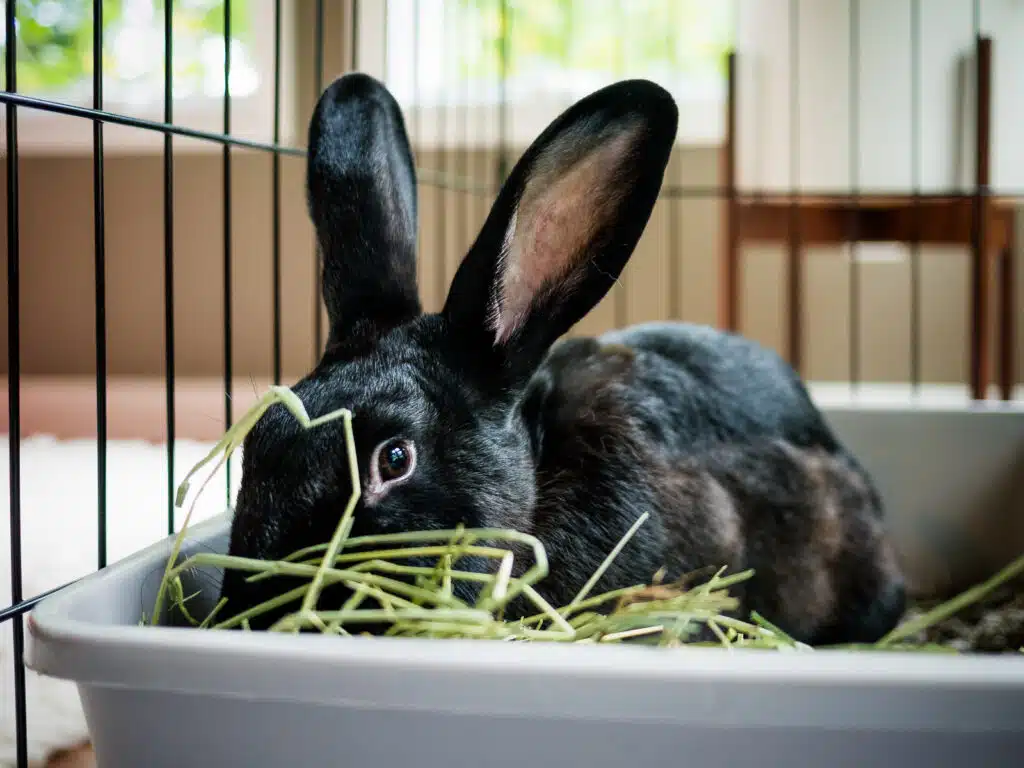Healthy rabbits are bright-eyed, curious, and full of energy. Because they’re prey animals, rabbits often hide illness until it becomes serious. Understanding what’s normal—and recognizing early warning signs—can help you prevent common health problems and keep your rabbit thriving.
How to Tell if Your Rabbit Is Healthy
A healthy rabbit:
- Eats hay throughout the day and drinks regularly
- Produces consistent, round and firm droppings
- Grooms themselves and keeps a clean bottom
- Moves easily and shows interest in food, toys, and people
If your rabbit suddenly stops eating, hides, or seems less active, treat it as an emergency. Rabbits can deteriorate quickly, so early veterinary care saves lives.
Common Rabbit Health Problems
Gastrointestinal (GI) Stasis
GI stasis is one of the most common—and serious—rabbit emergencies. The digestive system slows or stops, causing gas buildup and pain.
Symptoms: not eating, small or no droppings, hunched posture, grinding teeth, or bloating.
Action: Contact a rabbit-savvy vet immediately. Do not wait it out. Prompt treatment with fluids, pain relief, and motility drugs is often life-saving.
Prevention: A hay-based diet, daily exercise, and reduced stress help keep digestion moving normally.
Dental Disease
Rabbit teeth grow continuously. If they don’t wear down evenly, sharp points and overgrowth can cause pain, drooling, and reduced appetite.
Symptoms: dropping food, wet chin, smaller droppings, or weight loss.
Action: A vet can trim or file teeth safely under anesthesia and treat any underlying jaw misalignment.
Prevention: Offer unlimited grass hay and chew-safe toys to promote natural wear.
Respiratory Infections (“Snuffles”)
Caused by bacteria such as Pasteurella multocida, these infections can lead to sneezing, nasal discharge, and watery eyes.
Action: A rabbit-savvy vet can identify the cause and prescribe antibiotics and supportive care.
Prevention: Keep housing clean and well-ventilated, avoid stress, and minimize exposure to new rabbits without quarantine.
Flystrike (Myiasis)
Flies lay eggs on soiled fur or skin wounds, and the hatched maggots can burrow into tissue—this is a true emergency.
Symptoms: lethargy, odor, visible maggots, or damp fur around the rear.
Action: Immediate veterinary treatment is required.
Prevention: Check daily and keep your rabbit’s bottom clean, especially if they’re elderly or overweight, and protect them from flies in warm weather.
Ear Mites and Other Parasites
Ear mites cause itching, head shaking, and crusty debris in the ears. Other parasites, such as fleas or E. cuniculi, may also affect rabbits.
Action: Your vet can confirm the cause and prescribe safe antiparasitic medication.
Prevention: Keep indoor environments clean, and avoid contact with untreated outdoor rabbits or contaminated hay.
Heat Stress/Heat Stroke
Rabbits do not tolerate high temperatures which leads to heat stroke.
Symptoms: rapid breathing, drooling, lethargy, or collapse.
Action: Move the rabbit to a cool area and call a vet immediately.
Prevention: Provide shade, airflow, and frozen water bottles in summer. Never leave a rabbit outdoors in heat.
Preventive Care and Good Habits
- Diet: The foundation of health is unlimited grass hay, a small amount of leafy greens, and limited pellets. Avoid sugary treats and starchy foods.
- Exercise: Daily time to run and explore helps digestion, joint health, and mental well-being.
- Litterbox Checks: Droppings are an early clue to health—changes in size, shape, or quantity signal trouble.
- Regular Vet Visits: Annual checkups help catch dental or internal issues early.
- Vaccination: In the United States (and many other countries too) rabbits need yearly vaccine protection from RHDV2, a fatal viral disease. Ask your veterinarian about current recommendations.
When to See a Rabbit-Savvy Veterinarian
Call a vet right away if your rabbit:
- Stops eating or pooping for 8 hours or more
- Shows signs of pain (hunched, grinding teeth, hiding)
- Has nasal discharge or difficulty breathing
- Has diarrhea or a dirty bottom
- Seems unsteady, has head tilt, or can’t use their legs properly
Rabbits need specialized care—many standard vets are not trained in rabbit medicine. A rabbit-savvy veterinarian understands their unique anatomy, diet, and anesthesia needs.
Find a Rabbit-Savvy Vet Near You
Use our Rabbit Vet Directory to locate an experienced rabbit veterinarian in your area.
Early care makes all the difference.
Learn More About Rabbit Health
Explore detailed guides on specific topics:
- GI Stasis and Digestive Problems
- Dental Care for Rabbits
- RHDV2: What You Need to Know
- Parasites and Flystrike Prevention
For more articles, visit our full Rabbit Health Library.

